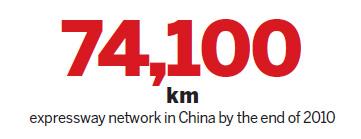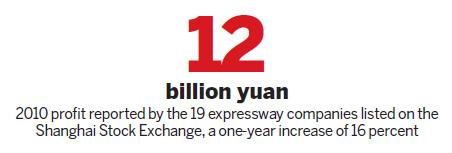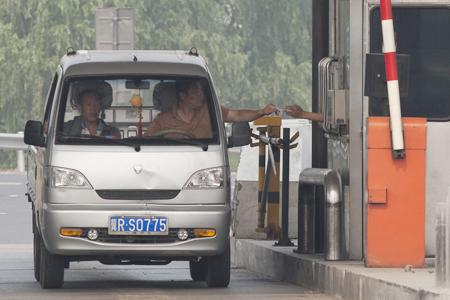
The toll changes hands, from driver to attendant, at the Bailu toll station in Beijing. Provincial governments finance most road construction through debt, which is to be repaid by tolls.[Photo / China Daily]
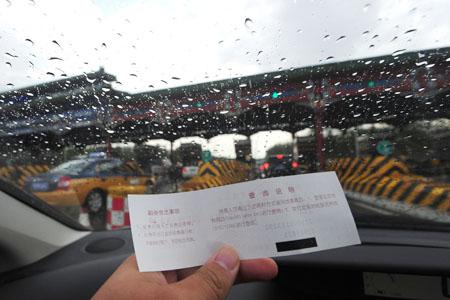
The toll for a car on the Beijing Airport Expressway is 10 yuan. The amount is on the other side of the ticket. [Photo / China Daily]
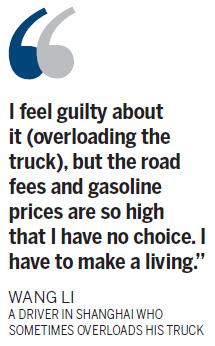
Highway fees become major source of income for governments, reports Gao Changxin in Shanghai.
Wang Li, a 36-year-old Shanghai truck driver, describes himself as a law-abiding citizen, except that he sometimes overloads his vehicle.
Wang said he is not greedy and sometimes he is caught by police and fined, but he has to do it to make money.
"I feel guilty about it, but the road fees and gasoline prices are so high that I have no choice. I have to make a living."
Wang, who is self-employed, has been in the business for seven years. He said the number of toll stations, legal and illegal, has risen in recent years.
Sometimes he pays more than 3,000 yuan ($463)
for a trip to Chengdu, 50 percent more than six years ago.
"I am thinking of finding another job," Wang said. "It's so hard to make money as a truck driver."
Recognizing the plight of Wang and others in his industry, the central government's executive committee on June 8 set out a basket of guidelines to aid the industry. It includes eight measures to cut toll charges and taxes.
Li Jing, 48, is an office clerk in Shenzhen, Guangdong province, bought her first car at the end of 2010. After a drive to her hometown in Hebei province, she wished she had traveled by plane.
She was charged tolls seven times, totaling 995 yuan, for the trip of about 1,000 kilometers. She paid around 400 yuan for gasoline.
"A plane ticket would have taken just half as much," Li said. "I was a little shocked to know that I have to pay that much for the roads."
Near the top in costs
Roads figure into the cost of what we eat, too.
Last month, a China Daily report said that farmers had left cabbages in the fields to rot in many parts of the country. Farmers said overplanting had dragged the wholesale price so low, around 0.1 to 0.2 yuan a kilogram, that harvesting them wasn't worth it. Prices in city supermarkets remain buoyed.
Figures from the National Bureau of Statistics in April show Chinese cabbage selling in 50 cities for 1.79 yuan a kilo on April 11-20. The price was 1.75 yuan in mid-May.
Experts say that while the excessive tiers of distribution dealers have helped trim the farmers' profits, high transportation costs also explain the price gap. The industry is often called logistics, and it involves the integration of information, transportation, inventory, warehousing, material handling and packaging.
"Logistics cost is extremely high in China. And at the root of that is the nation's extensive network of toll roads," said Li Hao, a researcher at Beijing-based Anbound, an economic information provider.
According to data published last month by China Federation of Logistics and Purchasing, logistics costs accounted for 18 percent of China's GDP last year, doubling the level in developed countries. Transportation alone is responsible for more than half of the logistics costs.
Most of China's transportation happens on the roads. They transport 74.1 percent of the country's freight carriers and 94.5 percent of passenger volumes, according to the Ministry of Transport.
According to data collected by Anbound, 95 percent of China's expressways, 61 percent of Class A highways and 42 percent of Class B highways are toll roads.
China has 100,000 kilometers of toll roads, accounting for more than 70 percent of the world's total of 140,000 kilometers, Sun Jiye, deputy head of Shandong Provincial Department of Supervision, said in March during the annual sessions of the National People's Congress and National Committee of the Chinese People's Political Consultative Conference.
"Fees charged by toll roads account for 30 to 40 percent of the cost of China's logistics companies. And if the cost were to be lowered to the level of developed countries, the nation could save 3.1 trillion yuan in logistics cost annually," Li said.
"That would help lower the country's consumer price and boost domestic demand, a policy that the central government pursues, as it's the consumers that finally shoulder the high logistics costs."
'Abnormal' tally
Already high, the road fees are made higher by the numerous illegal toll stations on the nation's roads.
Chen Lin, a 16-year truck driver in Shanghai who travels the country, said toll stations that are "apparently illegal" are widespread around the nation, especially in rural areas. He said some stations charge differently for the same distance on different occasions, and on some roads toll stations have been set up virtually "right next to each other".
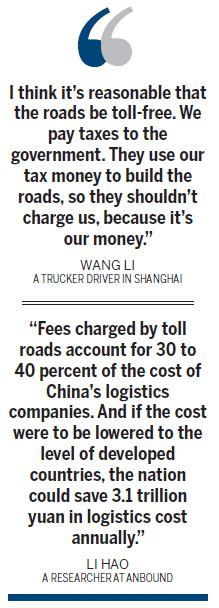
"I have heard that in some small cities, if you speak the local dialect to the toll station staff, you get a lower rate," Chen said. "Typically drivers don't want to argue with them, because we are on the roads and don't want trouble."
In 2008, the National Audit Office said in a report that illegal tolls and provincial tolls out of line with national permits and regulations amounted to $3.1 billion a year. That comprises $2 billion from 158 illegal toll points and $1.1 billion from amounts that exceeded toll regulations.
The audit office criticized the management of toll roads as loose, including exempting officials and government departments or cutting their fees, transferring operating rights to private enterprises without approval and using toll revenues for purposes other than repayment of road construction loans.
The Ministry of Transport announced on Tuesday that starting Monday, various government agencies will go after unauthorized highway checkpoints and illegal tolls. A joint notice by five agencies promised harsh punishment to violators of toll road laws and regulations.
Zhu Jian, a professor in the School of Transportation Engineers at Tongji University, said it is "abnormal" for drivers in China to pay this much for the roads they travel. Roads are public goods, he said, and the government should provide them freely.
"At the root of the problem is the financing pattern behind the nation's road construction, where the regional governments disproportionately shoulder the financing burden," Zhu said.
Profitable business
Massive construction of China's road networks started in 1984, when the central government approved a policy to allow financing road construction by debt, which would be repaid through tolls collected over a specified period.
Road-building boomed as the policy brought in capital. By the end of 2010, China had 74,100 kilometers of expressway network, the second largest in the world, compared with a mere 147 kilometers in 1989, according to the Ministry of Transport.
But in the boom, the central government mostly just set targets and standards for provincial governments. National-level funding of roads is insignificant, Anbound researcher Li said, and it has been left to provincial governments to raise the money for roads.
The provincial governments finance about 66 to 90 percent of the capital needed to construct and maintain the expressways through their own budgets and debt, according to a report published in April 2010 by the World Bank.
"With little financing from the central government, the provincial governments are left to find their own ways to get financed to meet the central government target," Zhu said.
To reduce their fiscal burden, the provincial governments enlist social capital by creating expressway companies, which allows for joint venture, securitized ownership, direct private sector investment, and different forms of leasing and concessions.
After completing the construction of a toll expressway, the governments will list the company on the stock exchanges and then invest the money paid by shareholders in construction of new toll roads.
Nineteen expressway companies are listed in Shanghai Stock Exchange's A-share market.
According to central government policies, every debt-financed toll road is given a specific concession period to recover its construction cost, with a ceiling of 30 years. But in many cases, the period runs longer, and some roads keep charging long after all the costs have been recovered.
"Running toll roads is so profitable that the provincial governments don't want to stop," Li said. "In fact, toll roads have become an important source of income in some regions."
According to a survey published by Securities Daily in 2009, the toll roads industry is ranked the most profitable in China. In 2010, the 19 listed expressway companies raked in about 12 billion yuan in profit, up 16 percent year-on-year.
Long time to repay
"The supervision by the central government is insufficient, mostly because the central government is not much financially involved. Many toll roads have concession periods much longer than 30 years," Li said.
"In fact, regional governments to some extent enjoy autonomy in how they deal with their roads."
An investigation report published by Guangdong provincial government in 2005 found that six toll roads in the province had concession periods of 100 years. One had a period of 756 years.
The 19-kilometer Beijing Airport Expressway, which started service in 1993, has a total investment of 1.165 billion yuan, with 765 million yuan in loans. After taking tolls for three years, the road was approved for another 30-year concession period by the Beijing government after being listed in Hong Kong, according to the National Audit Office.
By the end of 2005, the road had already taken in 3.2 billion yuan in tolls and a further 9 billion yuan is expected to be charged in the concession period, the audit office said. More recent numbers are unavailable.
He Jianzhong, spokesman for the Ministry of Transport, conceded that there are problems in the nation's toll roads.
"We don't evade the issues in the country's toll roads, including the opacity of information and irregular implementation of the central government rules," He said at a news conference in March. "The ministry has done research repeatedly and is taking measures to tighten supervision."
He also said 96 percent of the nation's roads will be toll-free in the future, but gave no timetable.
"I think it's reasonable that the roads be toll-free," Wang Li, the trucker driver, said. "We pay taxes to the government. They use our tax money to build the roads, so they shouldn't charge us, because it's our money."

